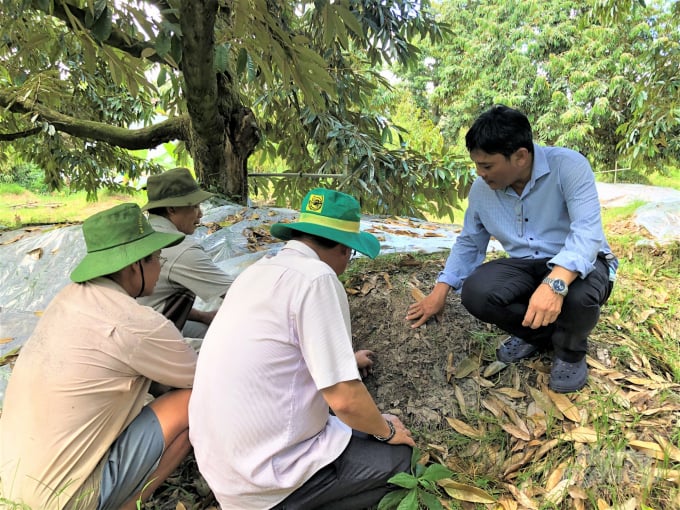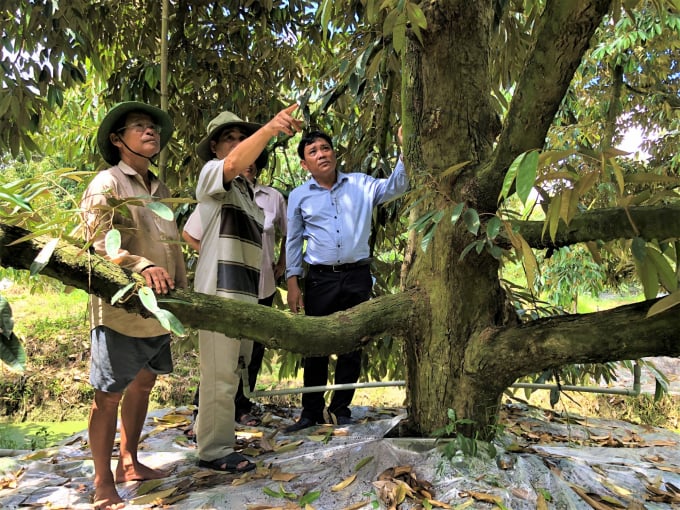May 21, 2025 | 03:03 GMT +7
May 21, 2025 | 03:03 GMT +7
Hotline: 0913.378.918
May 21, 2025 | 03:03 GMT +7
Hotline: 0913.378.918
In the early days of June 2021, we visited the "durian kingdom" in Cai Lay District, Tien Giang Province. At this time, gardeners were focusing on works over the roots to prepare for the plans to flower and give fruits.
Present at the durian garden of Mr. Nguyen Van Rep (nicknamed Bay Rep), in Binh Hoa B hamlet, Tam Binh commune, we constantly heard about the "shocking" historic drought in 2020. After only one drought "attack", nearly two-thirds of 1ha of well-growing durian in Mr. Bay Rep's garden were affected, died, and had to be cut down.

SOFRI has researched the process of durian recovery in "5 steps" and transferred it to farmers to help them apply flexibly based on the real conditions to improve and restore durian plants. Photo: Tran Trung.
Leading us to his durian garden, Mr. Bay Rep confided: “Last year, the salinity and drought lasted for the longest time in history, about 4 to 5 months, seriously affecting the whole region. When I saw the durian garden was in danger, shriveled, and showing signs of dying, I rushed to ask for help from the Southern Horticultural Research Institute (SOFRI) scientists who then came down to surveying and guiding us to undertake the caring techniques. Up to now, in addition to new plants, the others have been restored. That makes us very happy!"
According to Mr. Bay Rep, durian trees are very sensitive to saltwater, so when the whole area was affected, some years-old durian orchards had even died completely.
Similarly, during the saltwater intrusion, the over 1 ha durian garden of Mr. Nguyen Van Uoc's family (near Mr. Bay Rep's house) also suffered the same situation. Many durian roots over 20 years old were severely affected. The plants were shriveled and bare, so he had to cut down nearly half of the area for new planting. For the remaining durian trees, he asked SOFRI scientists for a survey to assess the level of salinity by measuring the pH and guide him on how to care with hope for recovery soon.
Meanwhile, Mr. Nguyen Hong Tam (hamlet 2, Cam Son commune, Cai Lay District) who planted 0.5ha of durian, lamented: "Saline has penetrated into all canals surrounding the entire durian garden for several months and causing depletion for more than 70% of the area so seriously that it became deciduous and almost impossible to recover. I could not think the salinity to last so long and had been partly subjective so I did not store freshwater for irrigation. After 4 months, the durian garden became "dry and thirsty", so the trees were exhausted and lost their leaves. Due to the influence of salt, the roots of durian trees were also damaged and gradually die. There were only a few trees that could survive the drought but not yet recovered completely. Finally, I had to give up the crop, not daring to let the trees bear fruit.”
Dr. Vo Huu Thoai, Director of SOFRI said that the recent drought and salinity had caused loss of productivity and affected the growth and development of fruit trees. Currently, durian farmers in the Mekong Delta provinces are facing many difficulties in restoring their orchards. On the basis of the experience drawn from previous droughts and salinity, we have studied the process of restoring durian orchards following "5 steps" and transferred them to farmers to apply flexibly based on the actual situation to help them effectively and restore their durian gardens' quality as soon as possible.
Dr. Le Quoc Dien, Director of the Center for Technical Advancement Transfer under the SOFRI said the "5-step" process will effectively help restore durian orchards after drought and salinity. The first step will focus on saline soil cleaning combined with liming to wash out sodium. In the second step, farmers need to restore the roots and leaves. The third step will concentrate on spraying nutrients to support the leaf development. The fourth step will focus on supporting the roots and leaves and enhancing nutrient absorption and photosynthesis. In the fifth step, the gardeners will use organic fertilizer over the garden.
“If these steps are applied correctly, the durian tree will recover quickly,” the official said.
Although the severe drought and salinity in 2020 have passed, many durian areas in Tien Giang Province are still heavily affected with durian production significantly reduced. Currently, the SOFRI in coordination with the Department of Agriculture and Rural Development (DARD) and local authorities to transfer new techniques to gardeners in order to help them soon revive the export durian area.
“Through surveying, we found that that durian gardens after being infected with salt have very bad leaves and dead branches. Therefore, this "5-step" process will help to care for the trees to produce fruits with evenly quality meeting all export requirements and contributing to maintaining the market in the future," said Dr. Dien.

SOFRI continues to conduct urgent research on building models of high-tech application in durian gardening to help boost the recovery from drought, salinity and adapt to saline intrusion for durian specialized areas in Tien Giang Province. Photo: MS.
According to Mr. Nguyen Van Man, Director of the Tien Giang Province’s DARD, in the last dry season, drought combined with deep and severe saltwater intrusion has damaged nearly 4,500 hectares of durian areas, of which up to 3,537 ha suffered from extremely serious damages.
“In the immediate future, the province will focus on reviewing the irrigation plans, adjusting and supplementing it to suit the situation of climate change and sea-level rise. It will also proactively complete irrigation works, dykes, sluices, and dams to serve specialized farming areas. At the same time, the province will first seriously implement synchronous solutions to protect and care for durian gardens during and after the dry season as recommended by scientists in a flexible manner and suitable with local production’s real conditions.
“The provincial agricultural sector is working with SOFRI scientists to find solutions to overcome and restore durian orchards affected by drought and salinity disasters in the last dry season of 2020. On the basis of scientists accompanying farmers, sharing experiences so that people can quickly recover and develop sustainably in the local durian farming area", Mr. Man said.
The SOFRI Institute is urgently conducting research to build durian garden models applying high technology to recover from drought, salinity and adapt to saline intrusion in Tien Giang Province. Thereby, it will help farmers in specialized farming areas have a scientific basis to improve their farming skills to recover and work towards the development of sustainable durian gardens, adapting well to climate change, and mitigating damage from natural disasters.
According to Tien Giang Irrigation Sub-Department, in 2021, drought and salinity is forecasted not as intense as before, but we should not be subjective, because the reality shows that the situation of salinity intrusion is getting deeper and more complicated if it happened. Currently, the authorities are working with farmers to proactively undertake many solutions such as reinforcing sluices and dams to prevent saltwater intrusion, building embankments to protect orchards, especially implementing many measures to store fresh water (as much as possible) for irrigation in durian garden during the dry season 2021 - 2022'.

(VAN) Japan's grant aid project contributes to capacity building, promoting organic agricultural production, and fostering sustainable community development in Dong Thap province.

(VAN) For years, the CRISPR-Cas9 genome technology has been reshaping genetic engineering, a precision tool to transform everything from agriculture to medicine.

(VAN) Vietnam aims to become a 'leader' in the region in the capacity and managing effectively soil health and crop nutrition.
![Reducing emissions from rice fields: [Part 1] Farming clean rice together](https://t.ex-cdn.com/nongnghiepmoitruong.vn/608w/files/news/2025/05/05/z6509661417740_a647202949c539012a959e841c03e1d3-nongnghiep-143611.jpg)
(VAN) Growing clean rice helps reduce environmental pollution while increasing income, allowing farmers to feel secure in production and remain committed to their fields for the long term.
/2025/05/19/5136-1-144800_230.jpg)
(VAN) The Nghe An Provincial People's Committee has just approved the list of beneficiaries eligible for revenue from the Emission Reductions Payment Agreement (ERPA) in the North Central region for the year 2025.

(VAN) 14 out of 35 domesticated elephants in Dak Lak province have had their living conditions improved, with 11 of them currently participating in the non-riding elephant tourism model.

(VAN) Muong Nhe Nature Reserve hopes that being upgraded to a national park will lay the foundation for forest protection efforts to be carried out in a systematic, modern, and sustainable manner.